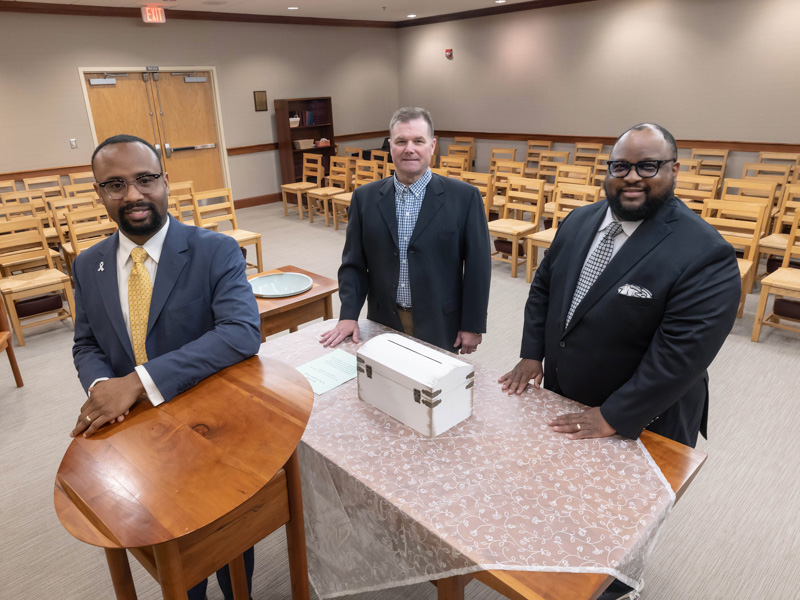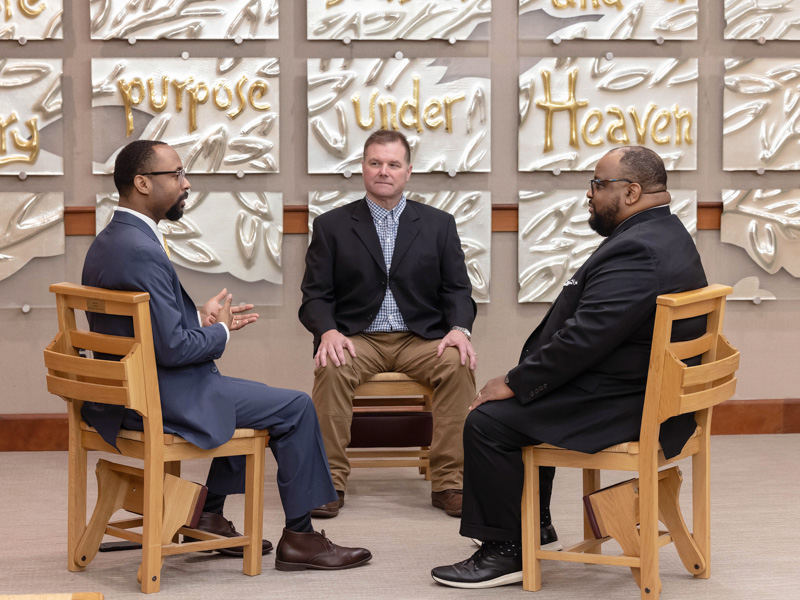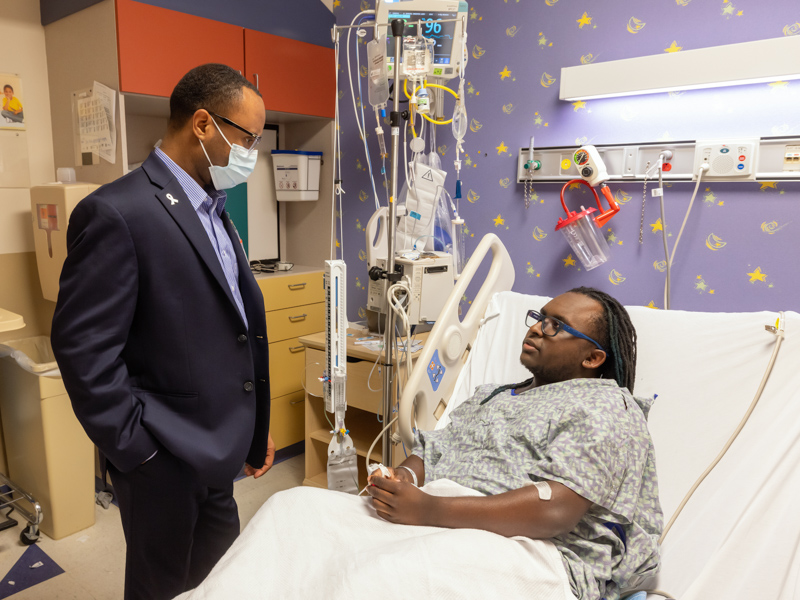In good faith: Chaplains’ personal stories resonate

In prisons, the military, hospices, hospitals – wherever chaplains appear, they serve as confessors, confidants and consolers to worshippers from many faiths.
They may see observers of Buddhism, Christianity, Hinduism, Islam, Judaism, or no faith at all.
At the University of Mississippi Medical Center, a trio of clerics representing what is now known as Spiritual Care Services make themselves available to patients and their families who may be in crisis, striving to provide a spiritual and emotional refuge for those whose beliefs may not be their own; this is what they’re trained to do.
But, during these daily encounters, they serve under the premise that, as God is no respecter of persons, neither are grief, doubt and suffering respecters of religions.
Each of these ministers became a chaplain for reasons that are unique but also universal, steeped as they are in emotions and motivations familiar to us all.
Mark Gilbert, who has been lead chaplain for about three months, joined the Medical Center just under three years ago; chaplains Charlton Johnson and Donald Mooney have been at the Medical Center for less than three months.
These are their stories.

CHAPLAIN CHARLTON JOHNSON
Creighton Johnson weighed 1 pound, 12 ounces when he was born. His twin brother, Corben, weighed two ounces more.
But Corben was the child Charlton and Benetra Johnson lost; he was two months old.
After Corben’s death, a hospital chaplain comforted his parents.
“When I was able to grow from my grief, I decided I wanted to be that same presence for other people,” Charlton Johnson said, “someone from the hospital who could support their faith at a critical time. I wanted to learn what it takes to be a chaplain.”
Born in Greenville, Johnson was brought up in the church there and, later, in Holly Springs, the son of a CME Church pastor who refrained from preaching to him about the joys of preaching.
A cantor at the Catholic school he attended, Johnson was asked one day by the priest if he had considered the priesthood himself. No, he had not; he wanted to have a family one day.
“But that helped nudge a conversation with my dad,” Johnson said. “He affirmed I had gifts for the ministry and was glad someone else approached me first; he didn’t want me to feel like he was pushing me.”
He needed no pushing. Over time, Johnson has held many a secular career. But those jobs did not answer his calling.
While living in Memphis, his father was diagnosed with multiple sclerosis; after Johnson moved there to help his mother care for his dad, he earned a Master of Divinity degree from Memphis Theological Seminary; that’s when he really began using the gifts his father had recognized.
For a while, he pastored several churches. In 2017, he completed a type of residency for chaplains – a Clinical Pastoral Education program; it was the year his father died.
Still in Memphis, Johnson joined Methodist Le Bonheur Healthcare and, as hospital chaplain, became a “presence” for the youngest patients and their families. The first family he supported had a child who died in the hospital.
“The questions they asked were mostly to God – ‘why my child?’” Johnson said.
“But they were also holding onto hope that God would get them through it. I told them, ‘God led through the valley of the shadow of death, and here I am.’ Apparently, my experience helped me to be able to give them space to weep, to mourn, and to let them see that God is with them.”
For more than two years, Johnson saw children at Le Bonheur, until he began working with older and, often, even sicker patients. He became a hospice chaplain, first in Memphis, then full-time for a company based in Flowood: About two years ago, in order to care for Benetra’s ailing mom in Pearl, they had moved back to Mississippi.
“As a hospice chaplain, I had a lot of windshield time,” Johnson said. Weary of traveling, he said, “I was ready to plug into one community.”
He found that community when he joined UMMC in mid-November. “When I saw a posting for a position, I felt it was time to come off the road.” He hasn’t done that, exactly; Johnson is also the pastor of a church in Bassfield, about 70 miles away.
But, at UMMC, as he travels from floor to floor and patient to patient, there is nothing he has to drive but himself. “I can’t fix anything,” he said, “but I can support people who face whatever they have to face. I know what it’s like.
“When Benetra and I lost our son, we felt alone; then, there was someone there to comfort us in our grief.
“My work makes me grateful, but it also makes me humble.”
About four months from now, Johnson may feel a little less humble when he watches Creighton graduate from high school.
Watching as well, most likely, will be Creighton’s younger brother, Charlton II, or “Deuce,” born five years ago to parents who, in the aftermath of loss, Johnson said, “see him as that little rainbow after the storm.”
CHAPLAIN DONALD MOONEY
By the time you read this, Donald Mooney will be on his way to Kuwait. For the next 10 months, that will be his home.
For nearly 35 years, Mooney has been a member of the U.S. Army Reserve whose service record includes a stint as a drill instructor – “which is a lot different from what I do now,” he said.
“As a drill instructor you train people to kill; now, I’m trying to help save people.”
Mooney, who holds the rank of major, has been a military chaplain since 2009. He has been a Medical Center chaplain since October.
Now, he’s on the way to the Middle East to offer prayers and support to troops and their families, and to Department of Defense workers and civilians, as he has also done in Djibouti, Kenya, Uganda, Somalia, Ethiopia and other nations flung far from his native soil in West Memphis, Arkansas.
“I had joined the military to pay for college,” he said, “but then it became about serving – serving God and our country.”
Mooney, who has a Master of Divinity degree from Liberty University, grew up in the Missionary Baptist Church and was led to the ministry through the examples of the late religious icons Billy Graham and Adrian Rogers, nationally-known minister and author John MacArthur, and a small-town church deacon: his father.
Over the years, he has delivered packages for FedEx and lessons in world history to his high school students in Memphis. But this is the work he believes he was really meant to do: “To meet someone who’s hurting, not just physically, but also emotionally, and then seeing that person, through God, heal.”
At UMMC, as in his previous chaplaincy at Methodist Hospitals of Memphis, Mooney normally meets people in their rooms or in the interfaith chapel. In the military, he may also meet them in the chow hall, the motor pool, or “wherever I run into someone who needs help,” he said.
“Just about everybody has something going on – with finances, their job, their marriage.”
As for his own marriage, he has much in common with wife Kyndalin, who is also an Army major and a chaplain. All four of their children are in the military. “We have a complete squad,” Mooney said, “and my wife is the squad leader.”
The couple moved to Mississippi because of their children, all grown and three of whom now live either in Brandon, where the Mooneys reside, or in Byram, where they are building a home. When Mooney found a position at the Medical Center, he was able to be closer to them, including a daughter who has fought breast cancer.
At UMMC, the patients he sees have their own battles – the physical ones are often obvious; not so with their other struggles. “But all I have to do is ask questions,” Mooney said, “and my ministry begins.”
CHAPLAIN MARK GILBERT
Almost from the day he first opened his eyes, Mark Gilbert saw his first chaplain.
“I was a preemie,” he said, “so I grew up visiting a lot of hospitals for rehabilitation, and a lot of chaplains visited me. I was so impacted by them that I became one.”
A Jackson resident, Gilbert also pastors Refuge Temple Pentecostal Church. For him, the contrasts between chaplaincy and pastoring can be stark.

“In the church, I’m Moses,” he said. “In the hospital, the patient is Moses.
“In the church, I lead people to where God is. In the hospital, the people lead me to where God is for them. As a patient, you may have your own spiritual resources, but trauma and grief can make it difficult for you to cope. Patients tell me what and where their resources are, and I try to help them get there.”
One of five children, including his twin brother, Lamar, Gilbert, like his fellow chaplains, was part of a family that was always in church; one day, he realized the church was in also in him.
“There was a tug, a nudge, a call inside me telling me that this is something I not only want to do, but also something I can’t shake,” he said.
But he lived in a city that had its own kind of religion: building cars. Brought up in Detroit, he decided, at age 20 to “escape the manufacturing environment,” a move his father questioned.
“I was breaking the family norm,” said Gilbert, whose parents and twin worked in the automotive industry. Multiplying his father’s dismay was Gilbert’s choice to earn a Bible degree in South Carolina, at Columbia International University.
“My father and brother were afraid for me to move to the South,” he said. “Also, it was my first time to leave home, and it was 900 miles away.” His mom, however, discerned the irresistible “tug” inside him.
“I borrowed her faith,” he said, “and made the decision.”
Years later, he earned his Master of Divinity degree from Liberty University, then immediately entered his chaplain residency and completed the Clinical Pastoral Education program at a Greenwood, South Carolina hospital. And then he went to prison; it was the only chaplain’s job he could find.
“When I first saw that barbed wire, I thought, ‘No way,’” Gilbert said. “But when I got behind that wire and those bars, I understood the power I had there; even though people were incarcerated, there was a freedom inside them, and I was able to help them find it.”
Gilbert would also serve as a hospital chaplain in South Carolina before he came to Mississippi, a move made possible because of his connection to his former pastor in Detroit, the founder of Refuge Temple.
“The church asked me to come down and preach a revival, and the members must have gotten something out of it,” Gilbert said. “The bishop’s board asked me to become pastor.” His wife, Victoria Gilbert, urged him to “see what’s behind the door,” he said.
The family, including school-age daughters, Hope and Faith, left for Jackson so Gilbert could answer the door. Soon, he discovered another door.
“I got the pull to be bi-vocational,” he said. A chaplain’s position opened up at UMMC, specifically in Children’s of Mississippi. Today, Gilbert is still preaching on Sunday, but also praying in the hospital much of the rest of the week.
Working with hospitalized children is “emotionally charged,” he said. “It’s something I never wanted to do. But now I see that it’s one of the most sacred aspects of chaplaincy. People not only let you into their lives; they also let you into their children’s lives.
“I believe it’s made me a better chaplain, but it’s hard.”
As told in a previous story, Gilbert joined the children’s hospital in April of 2020, just five days after his father died of COVID-19. Before his death, he had accepted his son’s decision to surrender to the nudge, the tug, the call; that is what Gilbert believes.
“I think he would be proud.” Of course, Gilbert would prefer to have both his father and his blessing here with him.
On days when the grief of others, and his own, becomes too much, Gilbert has a refuge just a few feet from his office. “I go to the chapel right here,” he said, “and I release what I can’t control to God.”


